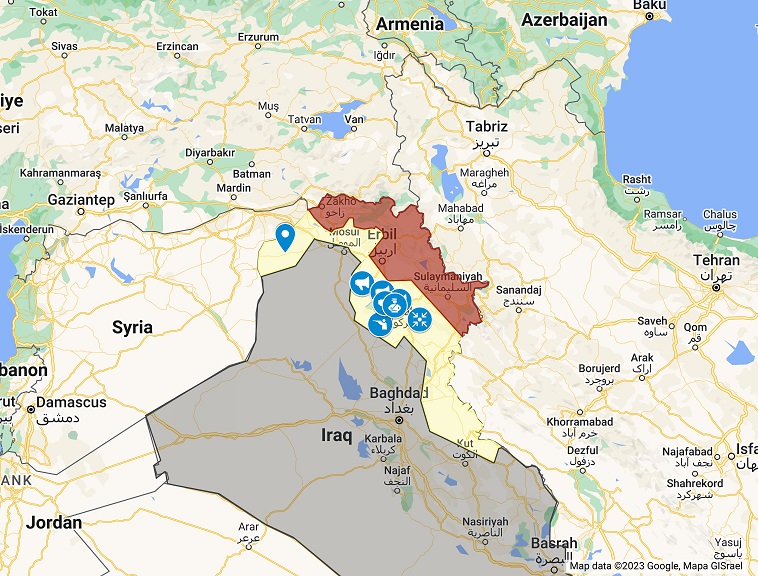1.3K
A biweekly brief of events and news occurred in the disputed territories.
Kirkuk
- On November 8, an Iraqi army force deployed troops in the Topzawa village, preventing Kurdish farmers from harvesting. Local protests accused the military of trying to occupy their lands, which had suffered Arabization policies by the former Iraqi regime. A recent memorandum by the Iraqi government ruled in favor of returning the lands to their original owners, but the Iraqi Defense Minister has yet to recognize it. Separately, the Iraqi Defense Ministry has summoned the families of fallen soldiers during the war on Da’esh to visit the relevant departments and receive an apartment complex as part of the compensation granted to the martyrs. However, the ministry’s initiative excludes the fallen Peshmerga forces who fought in the same war.
- On November 1, the provincial election campaign officially commenced in Kirkuk, spanning a period of 46 days. The elections scheduled for December 18, 2023, mark the first in the province since 2005. Thirteen parties and coalitions are set to participate, presenting a total of 224 candidates vying for 16 seats. With the exception of the Turkish-backed Turkmen Front, other ethnicities are represented by several parties. Notably, Sunni Arab and Turkmen parties, as revealed by a Kurdish lawmaker, have filed a lawsuit at the federal court of Iraq challenging article 12 of the elections law. This article pertains to the review of voter registrations. The Kurdish lawmaker highlights that non-Kurdish parties harbor concerns about the potential outcomes of the elections.
- On October 28, the North Oil Company (NOC) issued eviction notices for 40 homes occupied by Kurdish families since 2003, as these homes were constructed on the company’s land. However, a report by Rudaw revealed that only Kurdish residents received eviction notices, while numerous non-Kurdish homes just a few feet away faced no issues with NOC. Residents of the affected homes asserted that the houses were illicitly built on Kurdish lands by the former Iraqi regime, specifically for senior members of the al-Ba’ath party. A significant number of Kurdish residents are families affected by the Anfal Campaign and the massacres perpetrated by the Ba’ath regime before 2003.
- On November 5, the Iraqi Ministry of Oil announced the completion of a gas pipeline extending from the Khor Mor field in the Kurdistan Region’s Qadir Karam district to Kirkuk’s power plant. The ministry’s statement outlined that the pipeline is expected to provide 100 million standard cubic feet of gas per day and is directly linked to Kirkuk’s power plant in Taza. Notably, the execution of this project occurred without prior coordination and agreement between Dana Gas, the Emirate-owned main export contractor on the field, and Kurdistan’s Ministry of Natural Resources (MNR). Subsequent to the project’s completion, the MNR released a statement expressing concern over Dana Gas’s authorization to transport natural gas to any destination without obtaining concession from the ministry.
- On November 1, Iraq’s State Organization for Marketing of Oil (SOMO) released statistics indicating that there were no oil exports from Iraqi Kurdistan through Turkey’s Ceyhan pipeline in October. This cessation of Iraqi Kurdistan’s oil exports stems from a ruling by the International Chamber of Commerce in March 2023, which favored Iraq over Turkey and resulted in the suspension of exports. However, the SOMO report did reveal that 130,501 barrels were successfully transported from the Qarara field, falling under the jurisdiction of Kirkuk’s oil company, to Basra for export via oil tankers in October. This export activity generated $75,247,183 in revenue.
- On October 29, a senior Iraqi military delegation arrived in Kirkuk and held meetings with security commanders of the province. Led by General Brigade Qais al Hamdawi, the delegation discussed the “security challenges.” This visit marks the third in a month to Kirkuk after the ISIS (Da’esh) attacks in the province, which has posed a significant challenge for the Iraqi security forces to control since October 16, 2017. Meanwhile, on November 15, a violent clash occurred between Da’esh terrorists and Iraq’s counter-terrorism units, resulting in the death of several militants near Wadi Zeghitoun in the Hawija district. On October 31, the United Nations Investigative Team to Promote Accountability for Crimes committed by Da’esh (UNITAD) submitted its concluding report regarding the war crimes by the terrorist organization in the Taza subdistrict to the supreme court. The terrorist organization used banned gas during several of its attacks on Taza in 2014 and 2015.
Makhmour
- On November 1, senior Kurdish and Iraqi security commanders convened following clashes between Peshmerga forces and the Iraqi army over control of a military post guarded by pro-Kurdistan Workers’ Party (PKK) forces, securing the Makhmour Refugee Camp. Sierwan Barzani, the commander of the Peshmerga forces in the area, stated that the meeting aimed to “solve the issues” between the two sides, resulting in an agreement on defined “positions” for each force. The clashes led to the unfortunate loss of four Peshmergas and two Iraqi army soldiers.
Shingal (Sinjar)
- As per a statement from the Ministry of Displacement and Migration, 1150 Yazidi Kurds have returned to Shingal from the Duhok camp. However, a significant number of Yazidis remain displaced across the region due to the lack of security and basic services in the district. In a separate incident, a Turkish drone targeted a position of the Sinjar Resistance Units (YBS), resulting in the deaths of two members, according to a statement from the force. The airstrike occurred near the Snuny subdistrict, an area frequently targeted by Turkey, impacting the Yazidi Kurdish population.

